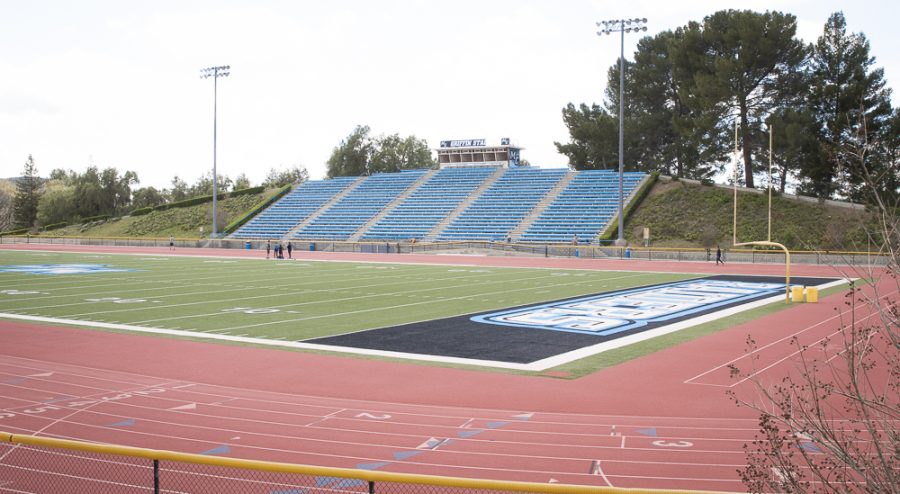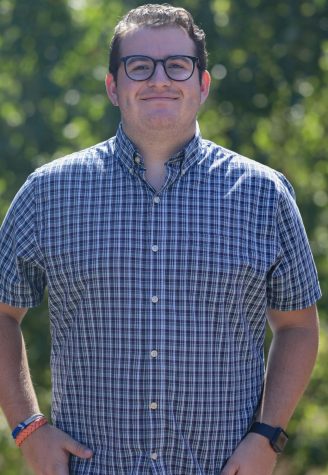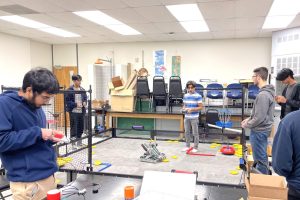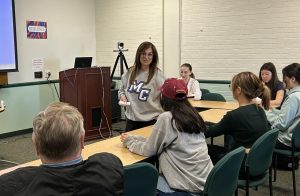Moorpark cross country makes offseason adjustments to prepare for the upcoming season
October 14, 2020
Moorpark College fell victim to the COVID-19 pandemic in early March, with all school activities suspended until further notice. Over the summer, speculation on when fall sports would kick off swept through the cross-country team.
Summertime has historically been the time of year for runners to get ramped up for the season kickoff in early fall, but with COVID-19 impacting the start date, sophomore runners like Makenna Smollen, 19, and Kathy Rodriguez, 19, have been forced to train without their teammates until it is safe to return to normal activities.
Cross-country training typically has runners divided into packs. After all, cross-country is a pack sport. Athletes run with their groups to maintain pace and preserve energy to shift it to the next gear down the final stretch. Facing the reality of running in a pandemic, Moorpark athletes will have to reevaluate their running strategies.
To follow coronavirus guidelines, runners will need to wear protective masks when running in a pack, if they can run in a pack to begin with. This presents a new challenge for runners.
Practicing, according to Smollen, looks very different now than it did a year ago.
“We have Zoom meetings on Mondays, Wednesdays and Fridays,” added Smollen. “In our meetings, Coach Kephart assigns us our daily workouts and we log them into a Google Sheets form so everyone can see. It helps keep us accountable.”
The coaching staff sets a practice routine for the runners to follow and log daily and although the form is there for accountability, not all runners are logging their runs.
“Some of our teammates don’t log their runs consistently,” said Rodriguez. “It questions whether or not we are all super motivated right now.”
The team is split into running groups determined by the pace of the runners. The faster runners train together and the next fastest together and so on, bringing up the concern of proximity to teammates’ exhaling breaths.
The main concern for Smollen is running solo. You don’t run together to make small talk. Runners stay with the leader and jump in front of them right before the finish. Training solo is nothing short of practicing a bad habit.
“Running on your own is called running in no man’s land. It’s just not something you want to practice doing,” said Smollen. “When we’re not together our passion kind of dies out.”
Togetherness is a concept that the team has struggled with when adapting to a season under coronavirus guidelines. Meeting for training and fostering a strong team bond was a struggle.
“In the beginning, we had a few runners meet only on Zooms where we played games like Cards Against Humanity,” said Rodriguez. “But other than that, we usually only meet with the coaches. In normal practice, there are many small moments you have with your teammates and that just doesn’t happen during our Zoom meetings.”
Returning to competition raises an ethical concern. As schools across the nation have been forced out of the classroom and into virtual learning environments, student-athletes debate if they would risk their health to compete in collegiate athletics. When teachers and students are unable to return to the classroom, why are athletes allowed to return to the training rooms and playing fields?
This weighs on the minds of athletes like Smollen and Rodriguez.
“At the end of the day, we are a student before we are athletes,” began Smollen. “Why should we be able to meet for sports if we can’t go to the classrooms. Professors did not sign up for this, and I think big schools are hurting because of this. A return to competition right now just isn’t practical.”
CCCAA also implemented a contingency plan for a spring return for athletics but what safety protocols will be implemented has yet to be seen.
The contingency plan will be reevaluated by the state this month to recommend if a resumption to school athletics is viable.
Moorpark College Athletic Director, Vance Manakas, remains optimistic for a mid-January return.
“Our athletes have been permitted to meet on campus once a week for out of season conditioning classes,” said Manakas. “Athletes are ecstatic– they are happy and accepting the conditions to return to campus.”
Mankas also commented about the weekly meetings held for athletes and coaches to speak up on their concerns about the impending season.
The CCCAA will meet again to determine if the contingency plan will go as scheduled.
As of now, Smollen and Rodriguez, along with their team, are scheduled to begin practice in mid-Jan. with their first league meet slated for Feb. 2, 2020. Gonzalez spoke on the unknowns of the season and the effect it has on their schedule.
“I think they are doing their best,” said Rodriguez. “I just don’t think we will start as scheduled. There are too many unknowns to say definitively that we’ll start on time.”
With a later start date comes more mild weather for SoCal, something that Smollen is looking forward to.
“At least training in the fall has better weather than training in the summer,” acknowledged Smollen. “The trails will be nicer and the air will be cooler.”
A positive note to end on during a compromised season.
Whether or not Moorpark College athletics will return as scheduled or at all, remains to be seen. What can be said is the athletes have mixed opinions on the restart. Only time will tell if the school can efficiently and effectively restart athletics.









